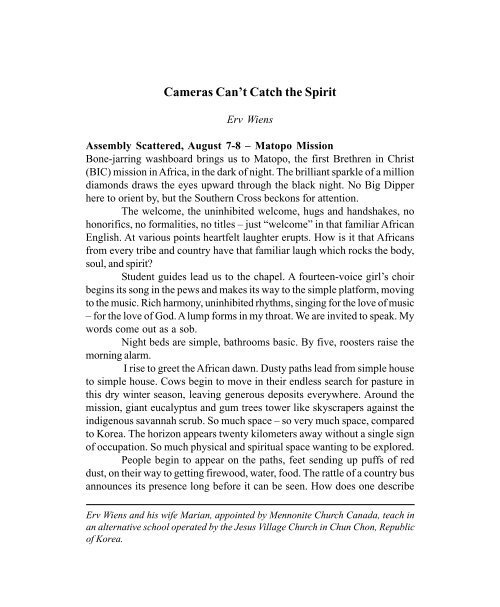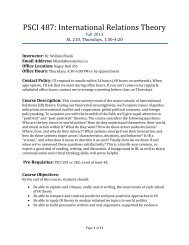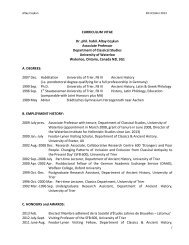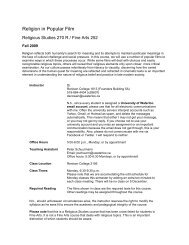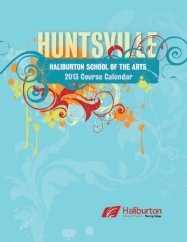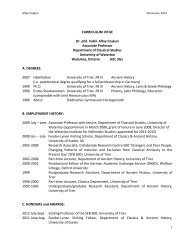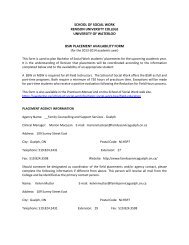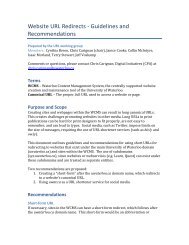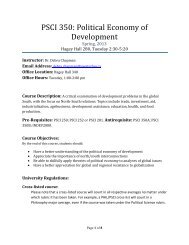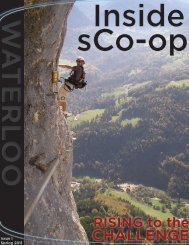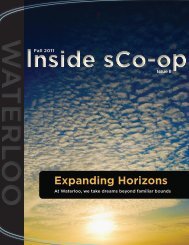Full article (PDF)
Full article (PDF)
Full article (PDF)
Create successful ePaper yourself
Turn your PDF publications into a flip-book with our unique Google optimized e-Paper software.
Cameras Can’t Catch the Spirit<br />
Erv Wiens<br />
Assembly Scattered, August 7-8 – Matopo Mission<br />
Bone-jarring washboard brings us to Matopo, the first Brethren in Christ<br />
(BIC) mission in Africa, in the dark of night. The brilliant sparkle of a million<br />
diamonds draws the eyes upward through the black night. No Big Dipper<br />
here to orient by, but the Southern Cross beckons for attention.<br />
The welcome, the uninhibited welcome, hugs and handshakes, no<br />
honorifics, no formalities, no titles – just “welcome” in that familiar African<br />
English. At various points heartfelt laughter erupts. How is it that Africans<br />
from every tribe and country have that familiar laugh which rocks the body,<br />
soul, and spirit?<br />
Student guides lead us to the chapel. A fourteen-voice girl’s choir<br />
begins its song in the pews and makes its way to the simple platform, moving<br />
to the music. Rich harmony, uninhibited rhythms, singing for the love of music<br />
– for the love of God. A lump forms in my throat. We are invited to speak. My<br />
words come out as a sob.<br />
Night beds are simple, bathrooms basic. By five, roosters raise the<br />
morning alarm.<br />
I rise to greet the African dawn. Dusty paths lead from simple house<br />
to simple house. Cows begin to move in their endless search for pasture in<br />
this . dry winter season, leaving generous deposits everywhere. Around the<br />
mission, giant eucalyptus and gum trees tower like skyscrapers against the<br />
indigenous savannah scrub. So much space – so very much space, compared<br />
to Korea. The horizon appears twenty kilometers away without a single sign<br />
of occupation. So much physical and spiritual space wanting to be explored.<br />
People begin to appear on the paths, feet sending up puffs of red<br />
dust, on their way to getting firewood, water, food. The rattle of a country bus<br />
announces its presence long before it can be seen. How does one describe<br />
Erv Wiens and his wife Marian, appointed by Mennonite Church Canada, teach in<br />
an alternative school operated by the Jesus Village Church in Chun Chon, Republic<br />
of Korea.
Cameras Can’t Catch the Spirit<br />
65<br />
an African country bus to someone who has never experienced it? I keep<br />
walking, trying to pray through my emotions and the flood of memories. I<br />
need to be here. I am emotional yet I am at peace – back in Africa where I<br />
discover a large part of my heart, left behind twenty-five years ago. Korea is<br />
polite and efficient and determined; Africa is simple and generous and inviting.<br />
Sunday, August 10 – Mtshabezi Mission<br />
Sunday morning we head for the Mtshabezi Mission church. Normally 1,200<br />
people crowd in here but the students are on vacation. About 250 people<br />
merge toward the front of the church. Thembani Dube, the gifted young<br />
music teacher at the school, leads the worship music. He has persuaded a<br />
dozen foreign visitors to be his response choir in that familiar African singing<br />
style. We are willing but inhibited and awkward. He sings his lead line, then<br />
nods for us to respond. But before we get our first words out, a burst of<br />
energy erupts from the front pews occupied by about three-dozen children. I<br />
stare, mesmerized. Ranging in age from three to ten, these children just cannot<br />
keep from singing. Snapping fingers, they bounce to the music. As the service<br />
proceeds, the worship leader tries several times to hush the boundless<br />
enthusiasm of the young singers. I wonder if I will ever have occasion to tone<br />
down youthful energy poured into praise and worship. “Unless you become<br />
as little children, you will not enter the kingdom of God.”<br />
Over lunch, the pastor informs us that many of these children are<br />
AIDS orphans. The BIC Church in Zimbabwe cares for nearly 10,000 such<br />
orphans. Once again the paradox of Africa leaves me speechless: all over the<br />
country creeps the terrible tragedy of the AIDS pandemic, yet here were its<br />
innocent victims praising God to the point where they were being hushed.<br />
Assembly Gathered, August 11-17 – Bulawayo<br />
Bulawayo, frayed former colonial hub – memories of Nairobi – sprawling<br />
jacaranda, flame trees, bougainvillea in bloom. Expansive homes of the wealthy,<br />
surrounded by walls and razor wire, juxtaposed with crowded townships of<br />
one-room shacks. Hawkers and beggars tug at the sleeve, hoping for a gift or<br />
an opportunity to relieve you of the burden of your wealth. We own too<br />
much. “Don’t display your cameras, don’t carry purses,” conference<br />
organizers tell us again and again. Listless security guards slouch everywhere.
66 The Conrad Grebel Review<br />
“Assembly Gathered” squeezes 7,000 guests from more than 50<br />
countries into the Bulawayo fairgrounds. It seems that every language under<br />
heaven is spoken here. Why it is that I recall more Swahili from thirty-five<br />
years ago than the Korean I learned last week? We stand in lines, waiting –<br />
watching anxious Americans and concerned Canadians push to the front,<br />
demanding answers to questions that haven’t even crossed the African mind.<br />
Waiting in food lines, waiting in the never-ending internet lines, I greet old<br />
friends, meet new friends, catch snatches of conversation, hugs and handshakes<br />
as the lines snake along. I’m still awed at being recognized by a woman who<br />
remembered me from fifty-two years ago in Coaldale, Alberta. We eat simple<br />
food of corn meal with plenty of stringy beef – and always oranges.<br />
Worship and workshops fill our days. The money offerings are<br />
something else – large buckets overflowing with terribly devalued Zim dollars<br />
and sought-after American dollars. Cerebral Europeans, structure-conscious<br />
North Americans, energetic Latinos, emotional Filipinos, and heartwarming<br />
Africans communicate through body language, intonation, and words. And<br />
the music! Again and again the music, especially the African music, brings<br />
the crowd to its feet. We can’t get enough. All night long, snatches of song<br />
echo through my head and heart.<br />
Multicultural worship, crosscultural fellowship, endless diversity of<br />
expression in dress and language and color – all making up “one body . . .<br />
called to one hope, one Lord, one faith, one baptism, one God and Father of<br />
all, who is above all and through all and in all.” How does one capture this<br />
rich diversity? Everyone is taking pictures, but cameras can’t capture spirit.<br />
The conference theme, “Sharing our gifts in suffering and in joy,”<br />
remains etched on my mind. I took a few bags of sugar and boxes of biscuits<br />
and candy to share with our wonderfully hospitable hosts. But it seemed so<br />
insignificant in light of what I received in return. What can I say? I struggled<br />
to give up the opportunity to join Marian, spending precious time with family<br />
and extended family in Canada. In its place I had a foretaste of heaven in<br />
Africa. “After this I looked, and there was a great multitude that no one could<br />
count, from every nation, from all tribes and peoples and languages, standing<br />
before the throne and before the Lamb . . . saying, ‘Salvation belongs to our<br />
God who is seated on the throne, and to the Lamb!’”


